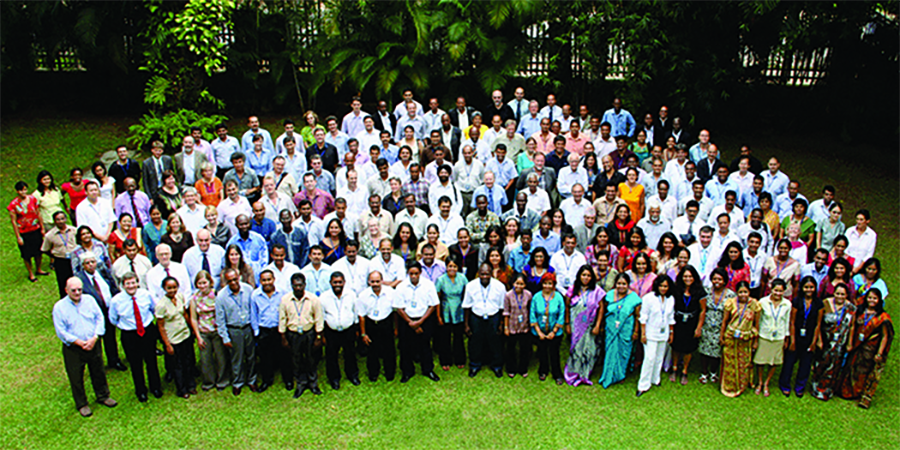heading
2012: The International Water Management Institute
The International Water Management Institute (IWMI), with headquarters in Colombo, Sri Lanka, has been named the 2012 Stockholm Water Prize Laureate for their pioneering research that has served to improve agriculture water management, enhance food security, protect environmental health and alleviate poverty in developing countries.

Seventy percent of global freshwater withdrawals are used in agriculture. With global food demand projected to double by mid-century, more food will need to be grown with less water. IWMI has been the driving force promoting policies and techniques to help farmers to produce ‘more crop per drop’, and to implement solutions that enable agriculture to cultivate enough food to feed the planet’s growing population with limited water resources.
In its citation, The Stockholm Water Prize Nominating Committee states: “The International Water Management Institute is the foremost organisation in agricultural water management. Their work has led to new policies and investments in agriculture that have not only enabled more productive use of water, but have enhanced food security, economic development and environmental health around the world.”
On receiving the news, Dr. Colin Chartres, Director General of IWMI said: “It is an incredible honour for our organisation… The real winners, of course, are IWMI’s dedicated staff members who, for just over a quarter of a century, have consistently delivered research of the highest quality. This work has had a profound influence on water management policy throughout the globe, delivering real benefits for some of the poorest people on earth.”
Leading global knowledge and local solutions to address water scarcity
Over the past quarter century, IWMI has established its place as the definitive source for comprehensive data and knowledge on global water resources. From 2002-2007, IWMI led a team of 700 scientists to produce one of the most important research programmes of water management ever conceived. The resulting publication, Water for Food, Water for Life: A Comprehensive Assessment of Water Management in Agriculture, established an unprecedented knowledge base on the status of global water and land resources, and is one of the most influential studies ever produced on water and agricultural policy. By providing clear evidence of where and how water scarcity has increased and its impact on all sectors of the economy, the report’s findings have placed sustainable water resource management as a priority issue for governments, industries and international organisations around the world.
The institute’s extensive work with irrigation reform has led the way for new and improved design, operation and maintenance of irrigation systems throughout Asia and Africa. IWMI has also helped shape the current international guidelines on how wastewater can be safely used in agriculture, a practice that is employed by tens of millions farmers worldwide. IWMI continues to lead new initiatives to establish business models to attract investments in wastewater reuse systems that can benefit rural communities in developing regions.
Mapping the world’s water resources
IWMI’s advancements in the application of remote sensing and geographic information systems (GIS) analysis have dramatically improved our ability to measure the availability and efficiency of water use, and directly enables farmers across the world better manage agriculture water resources. IWMI’s Water Data Portal, and its global maps on water scarcity, irrigation use, environmental flows, and drought patterns, are among the most important information source in the water science arena. Over 100,000 publications are downloaded from the IWMI website every month, and are widely read on leading digital repositories worldwide.
This work has also led to the creation of a water accounting system that can determine the amount of potentially usable water in a basin, assess where the water is going and calculate the actual cost per cubic meter. The tool is widely used by planners to identify where water can be saved, and how it can be used most effectively.
Bold vision for the future of agriculture
The 2011 publication, An Ecosystem Services Approach to Water and Food Security, led by IWMI and the United Nations Environment Programme, outlined how a new ‘ecosystems-based’ approach to agriculture can protect natural systems and potentially double agricultural production. The continued work in this area can radically change how agriculture is practiced in the future and ensure food security for a global population set to reach 9 billion by 2050.